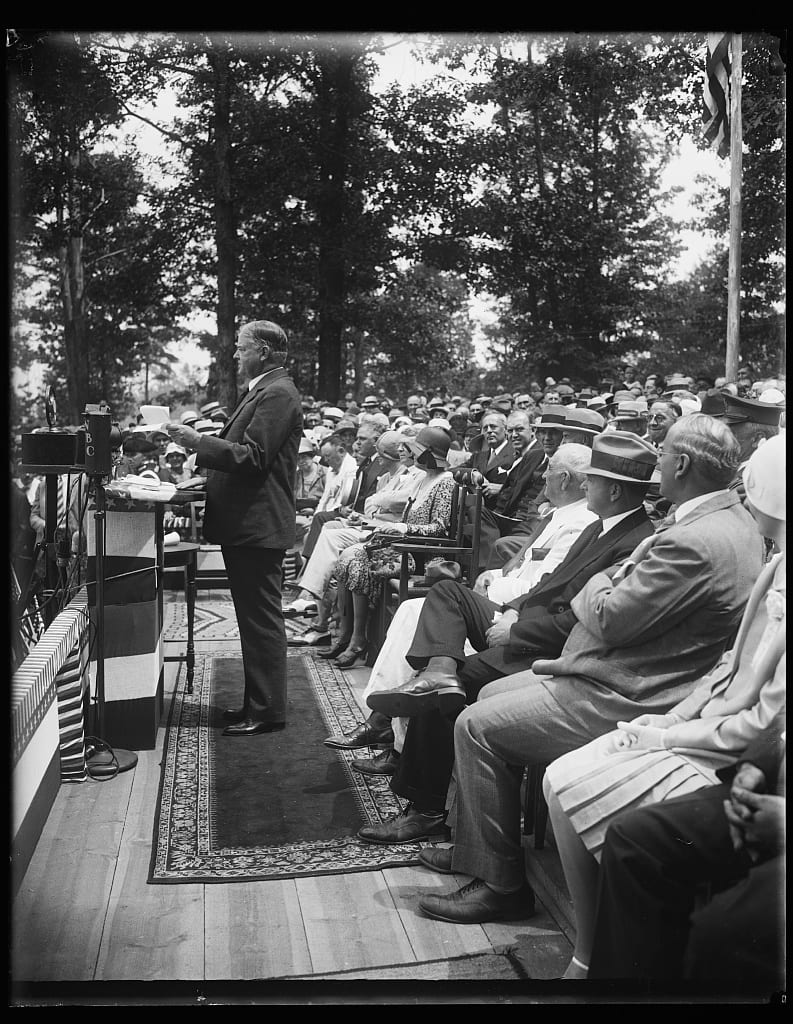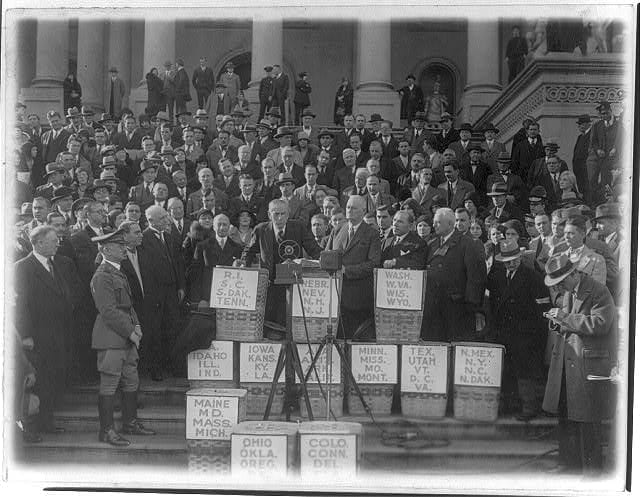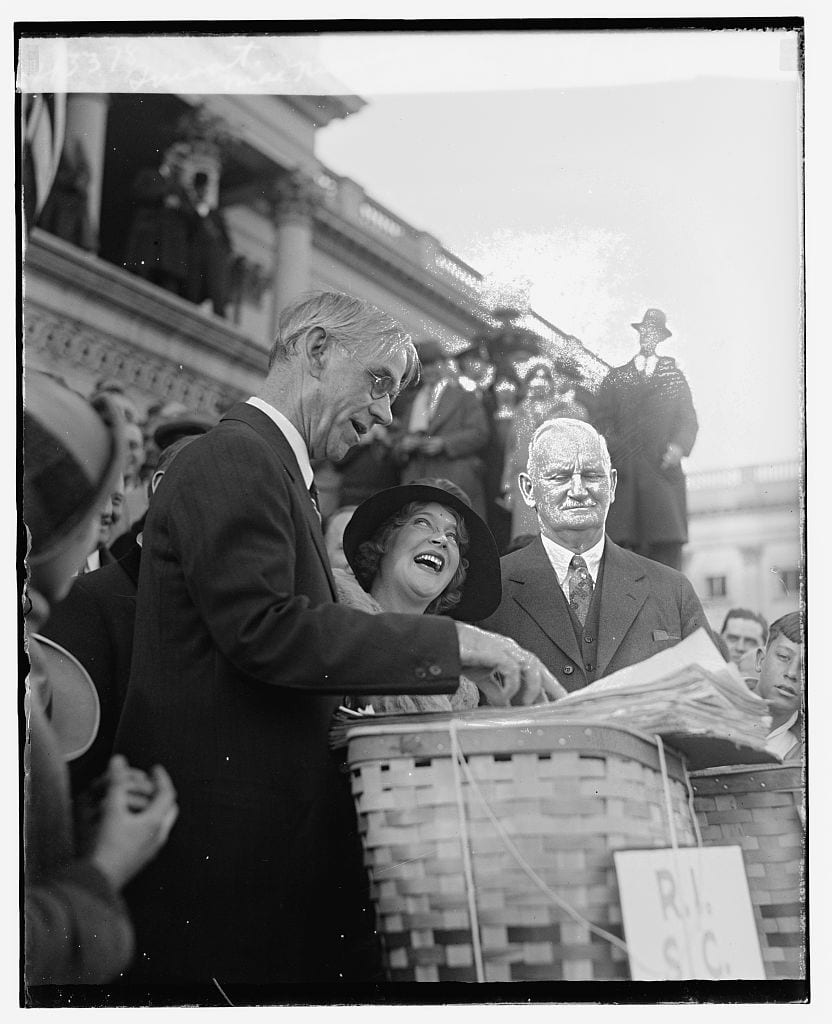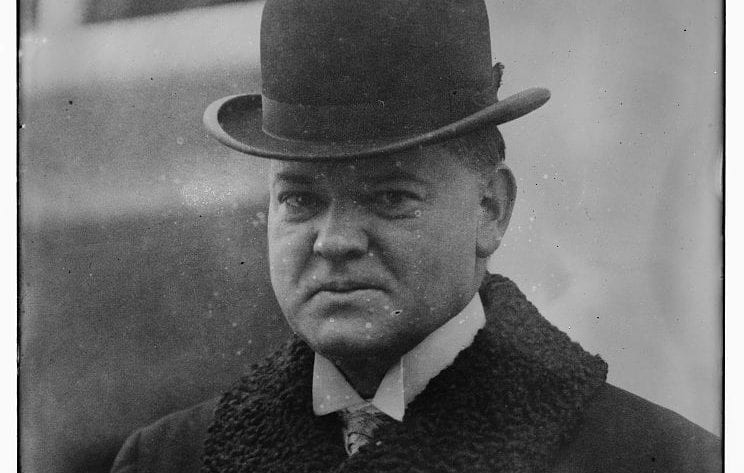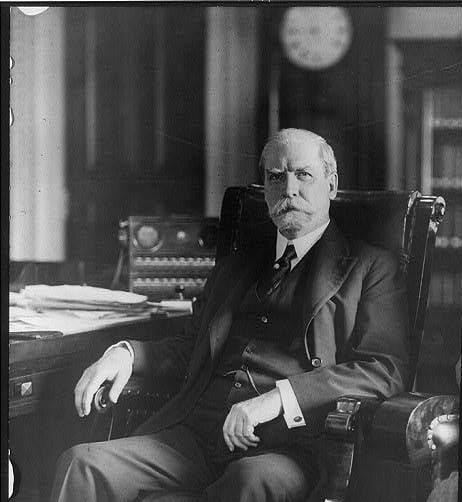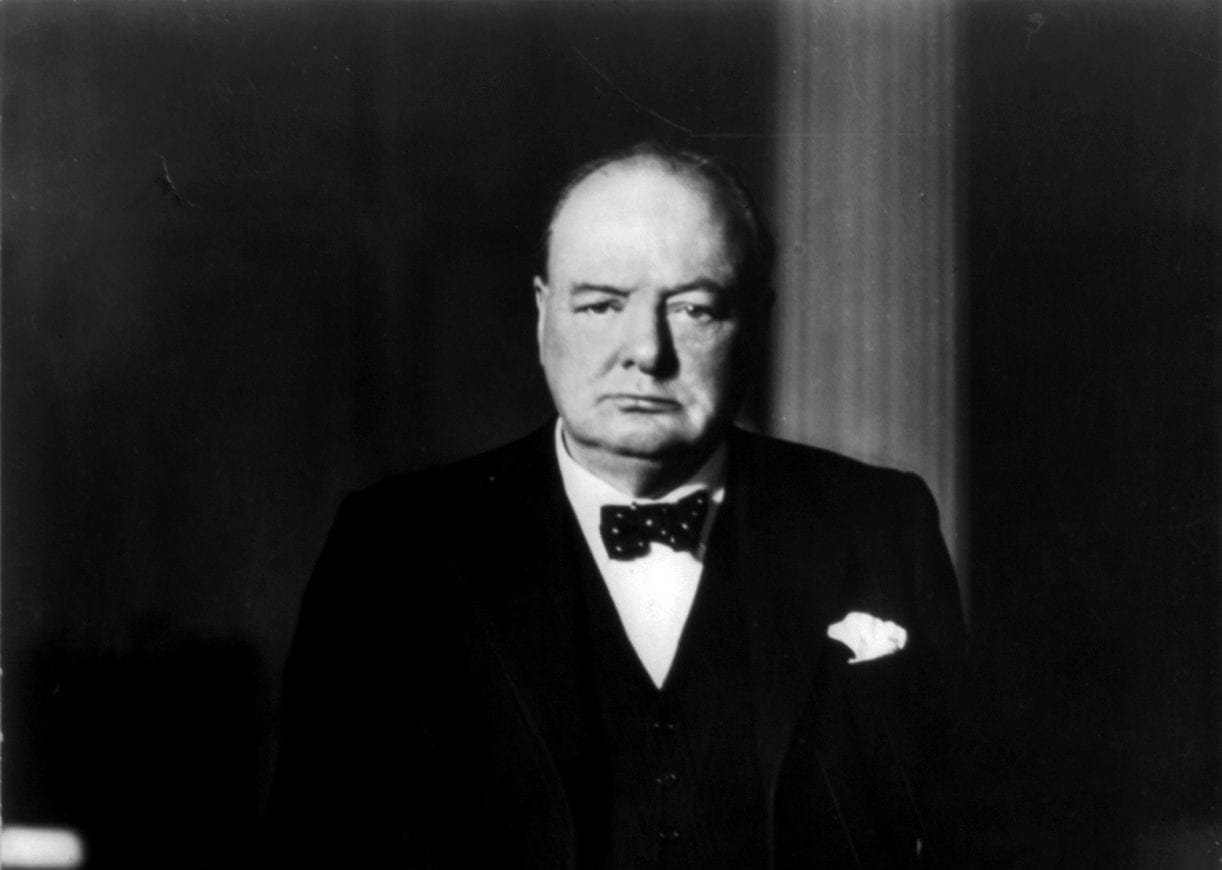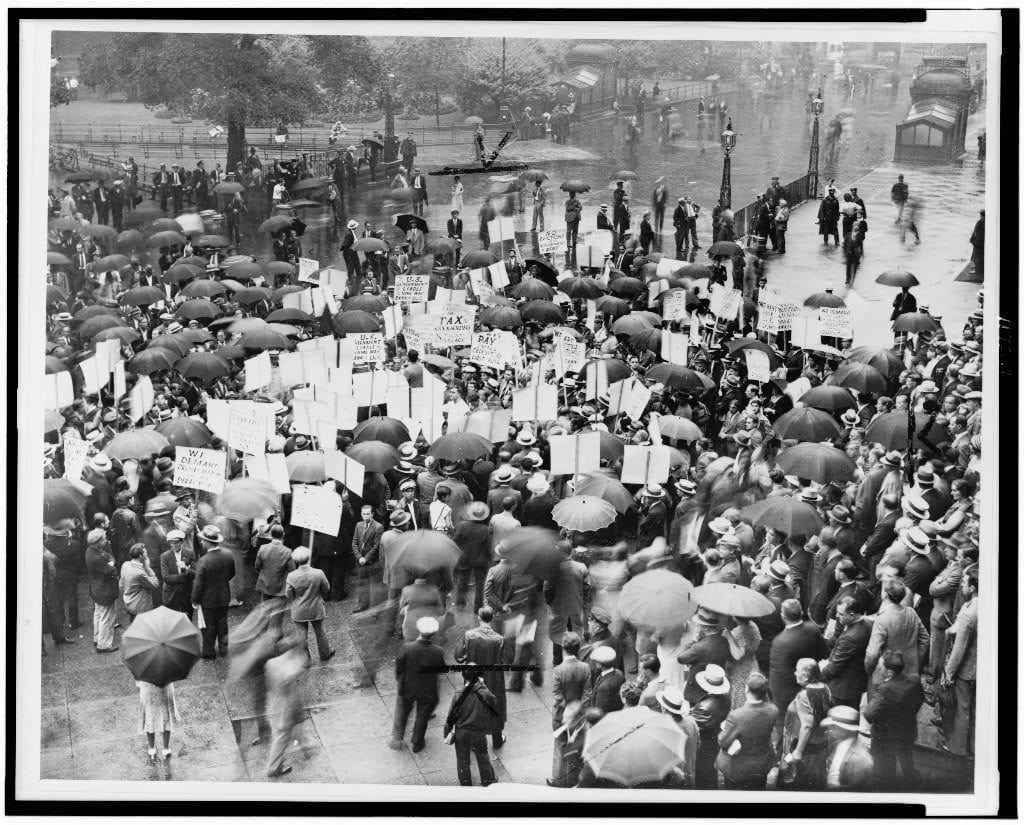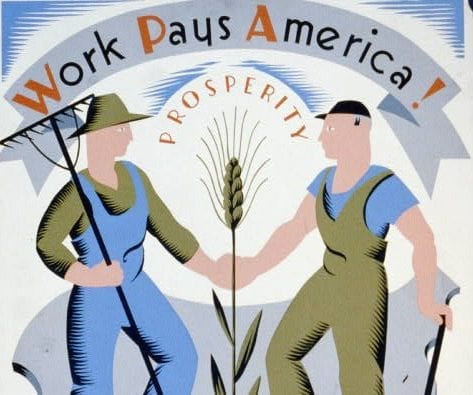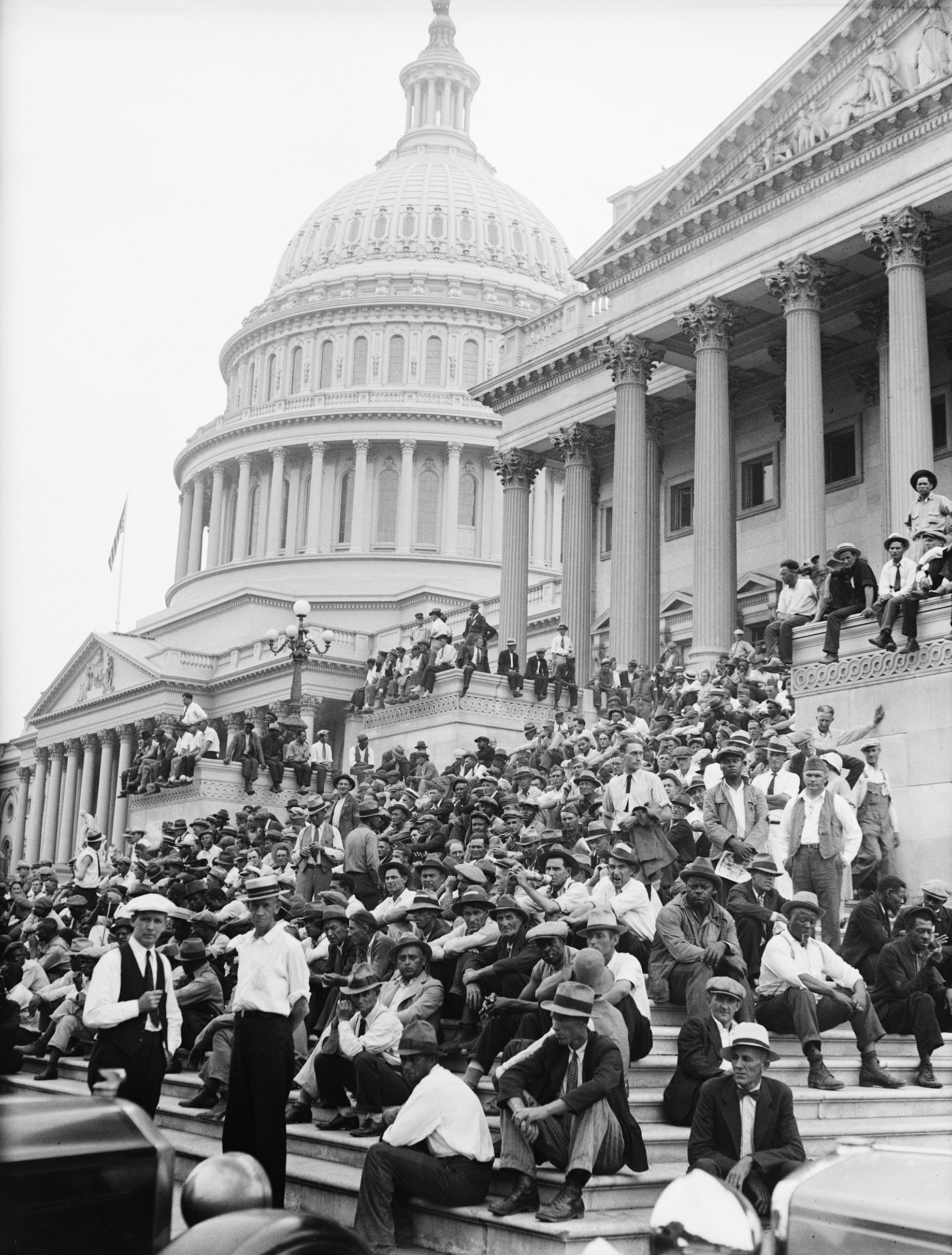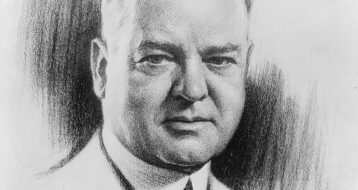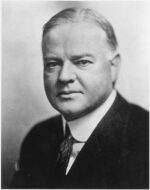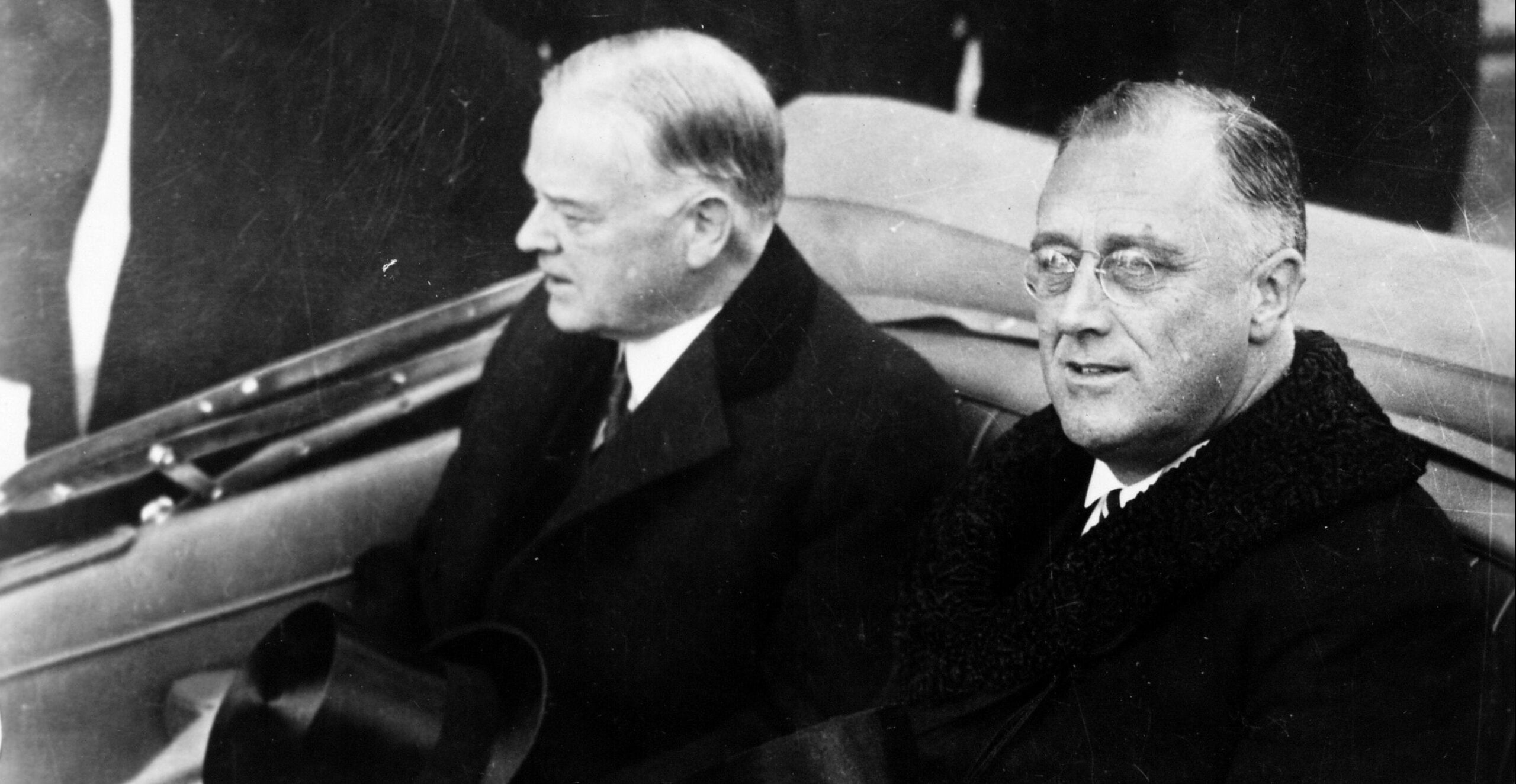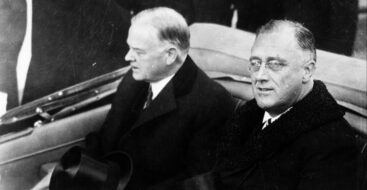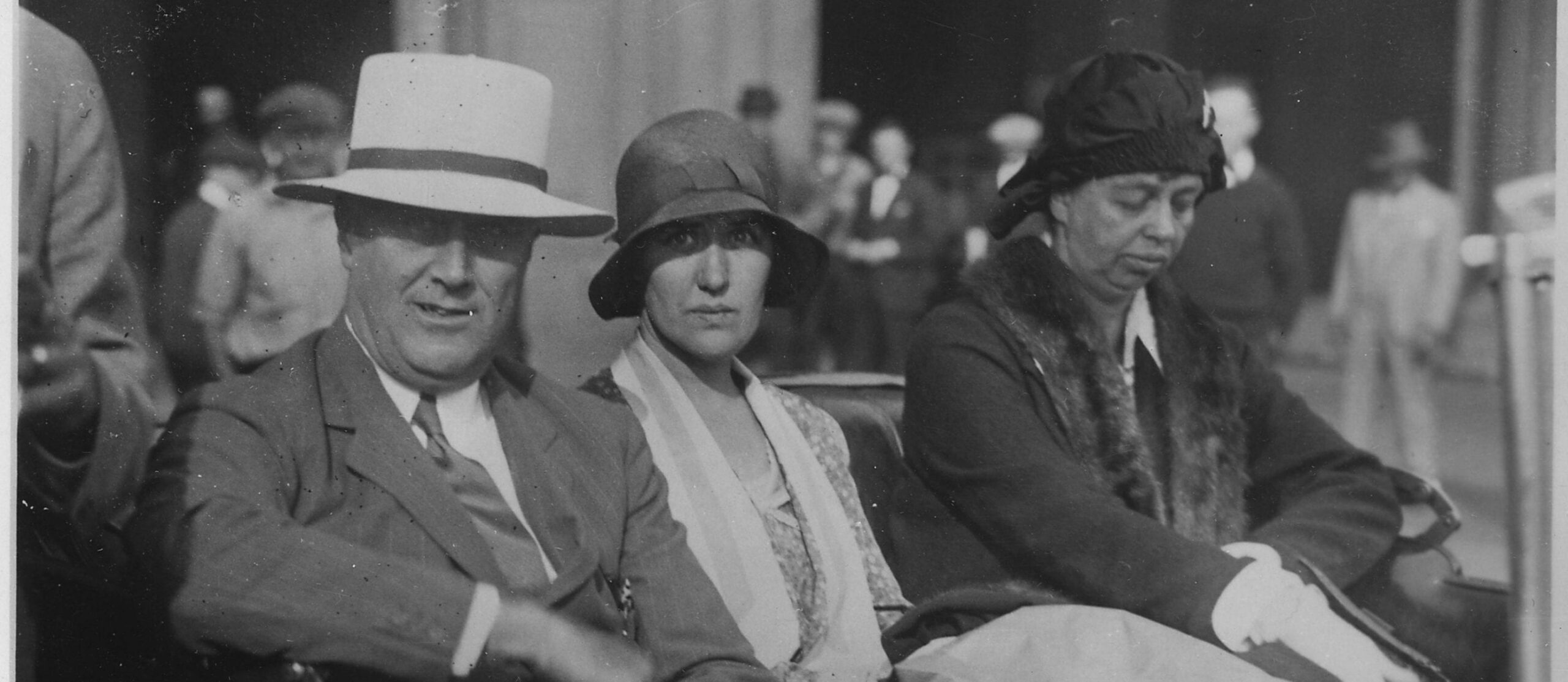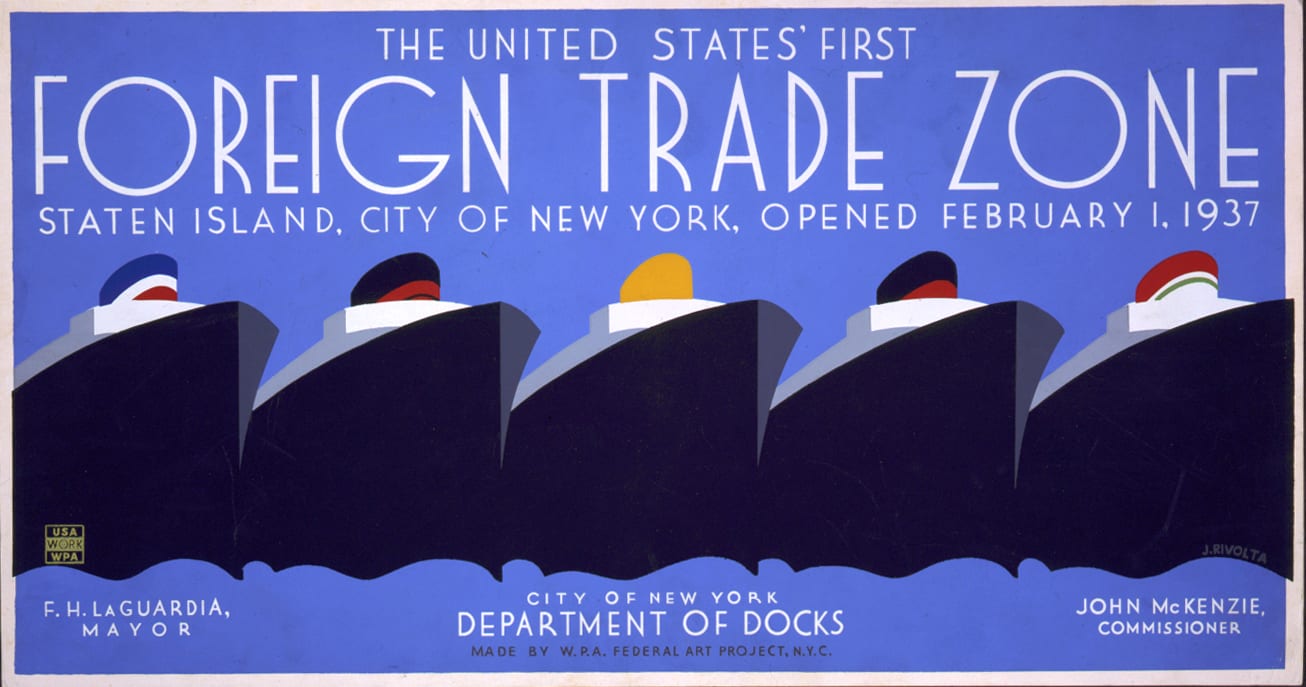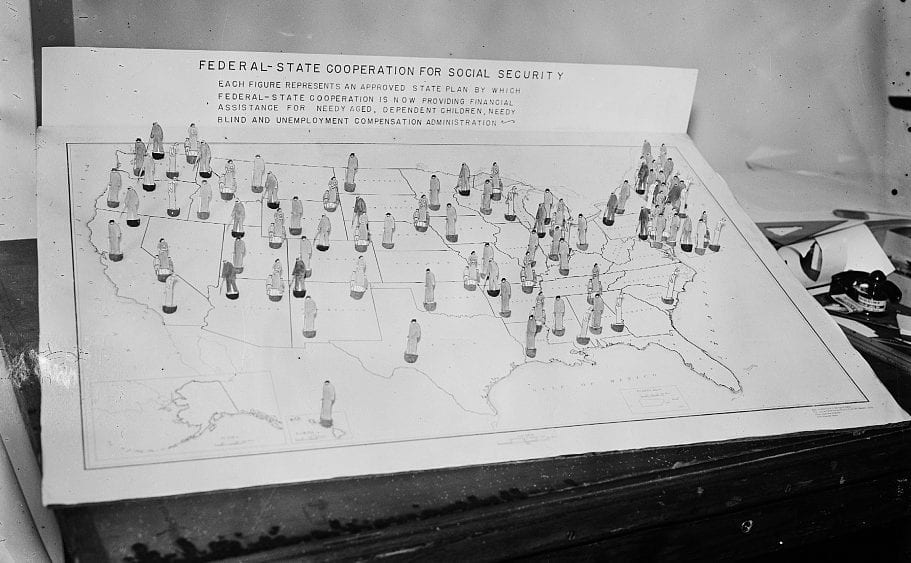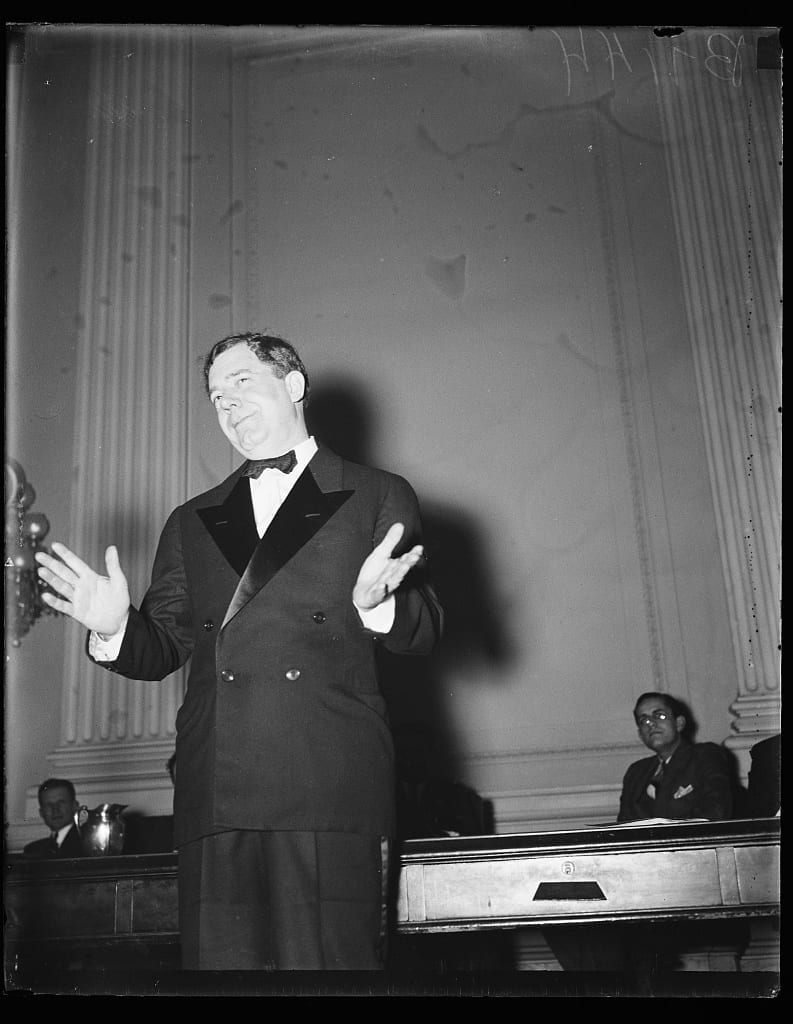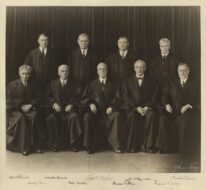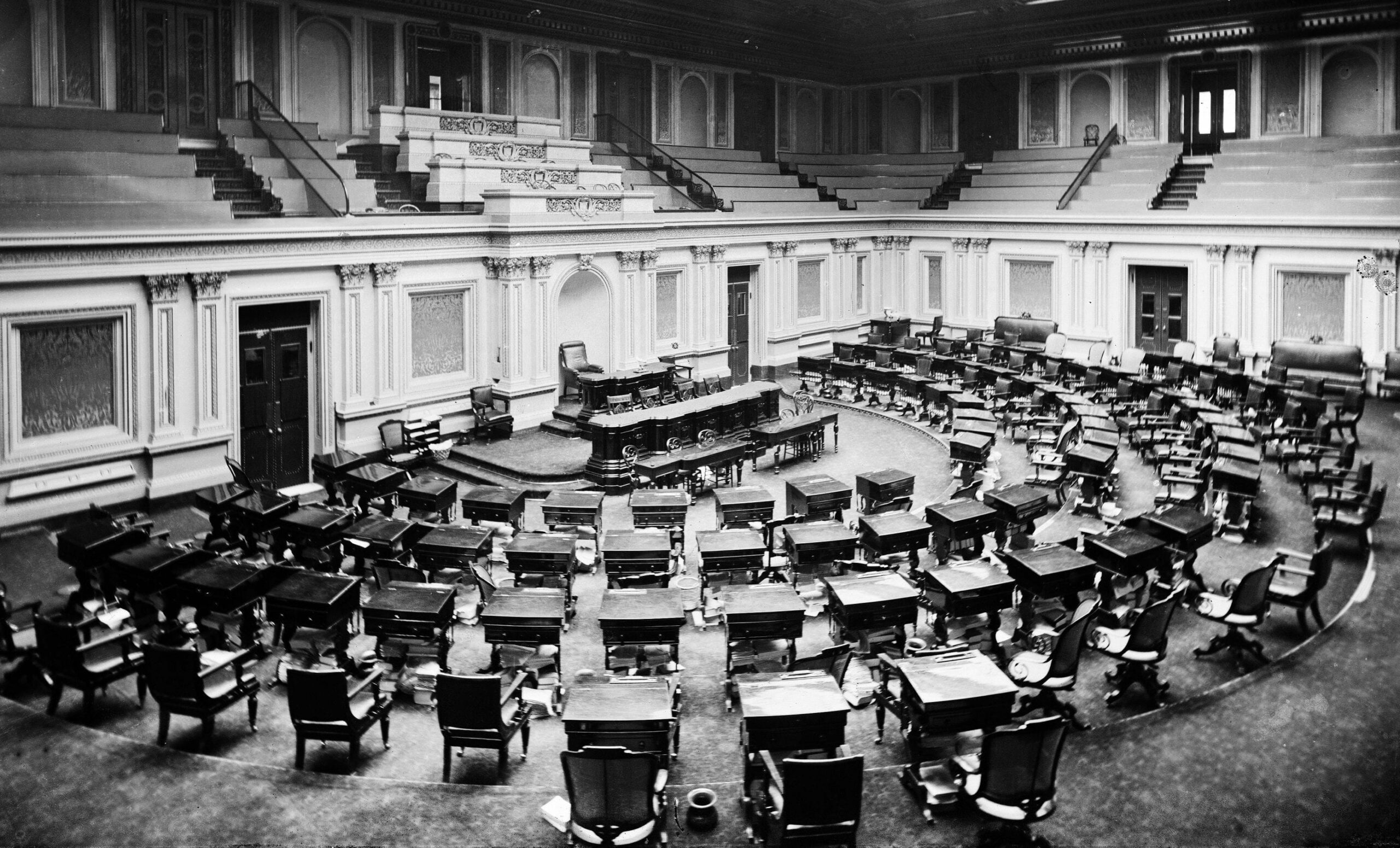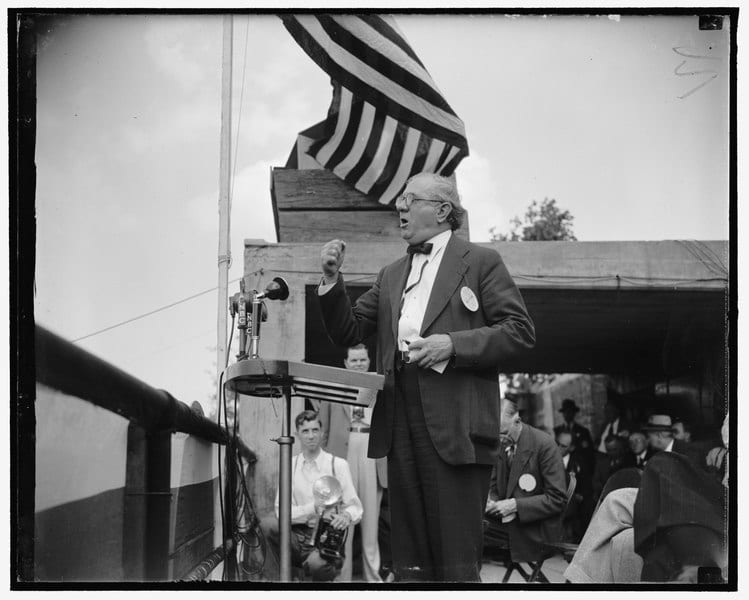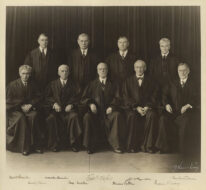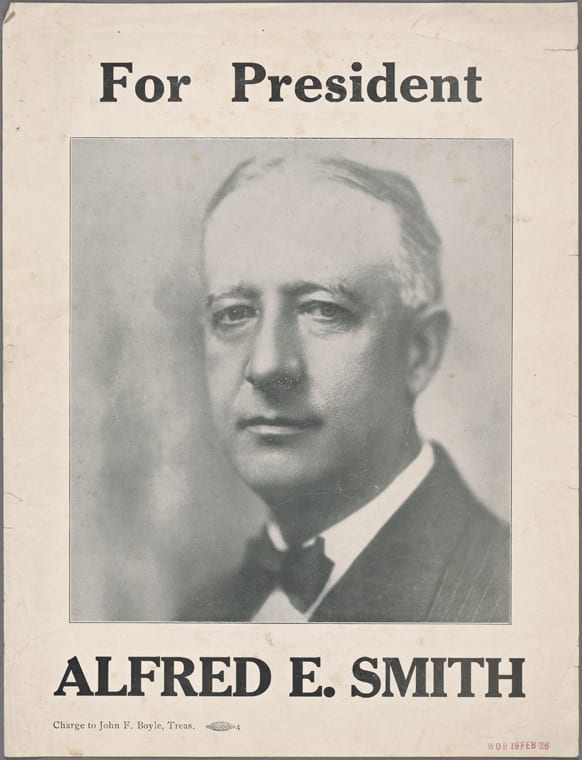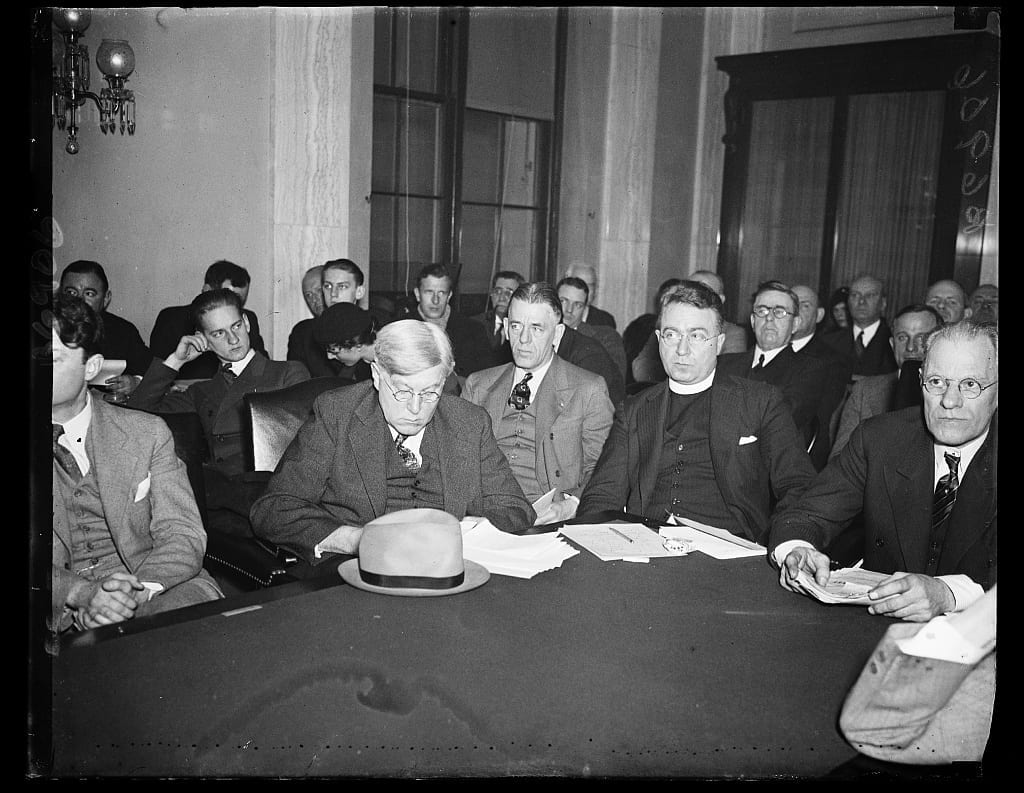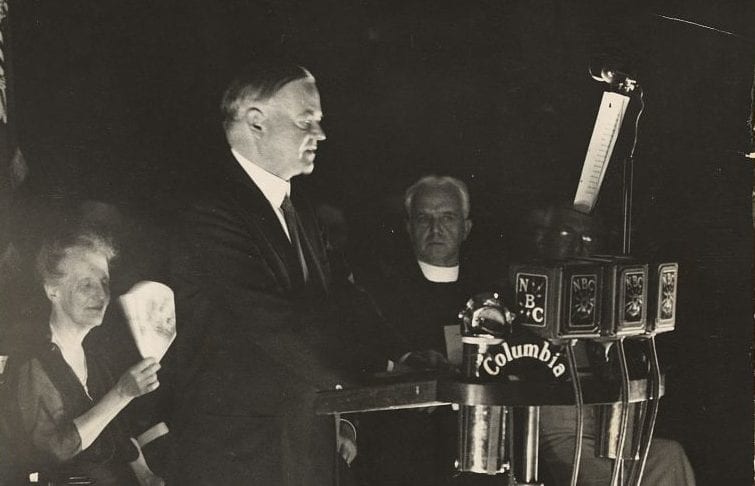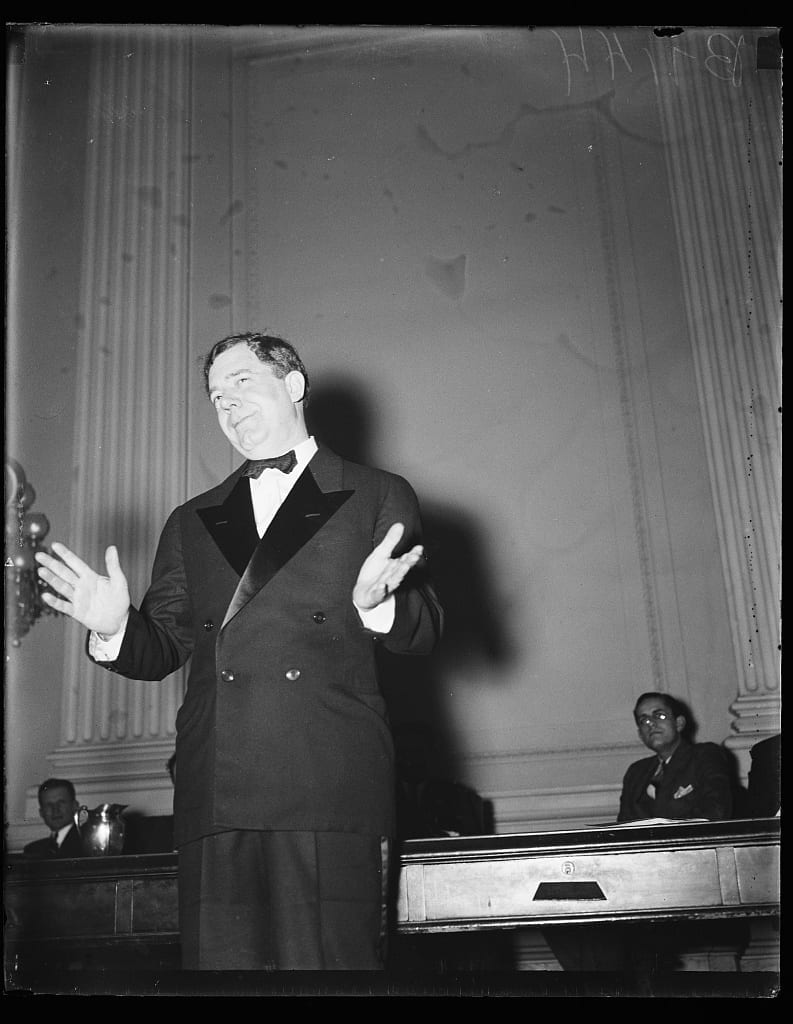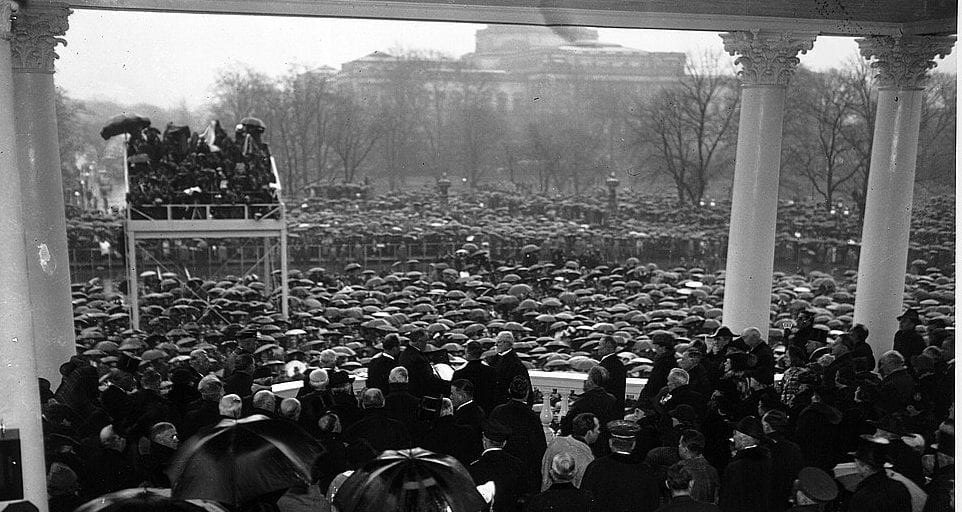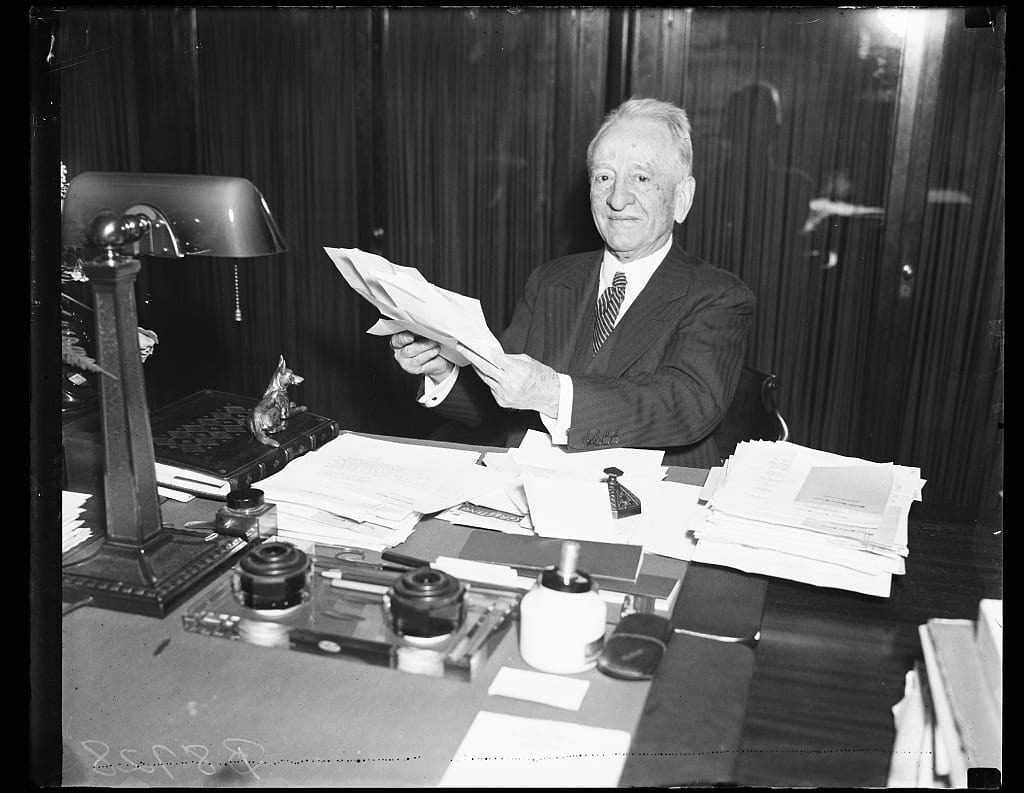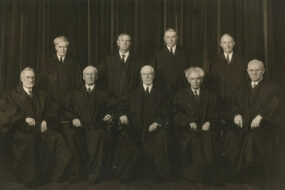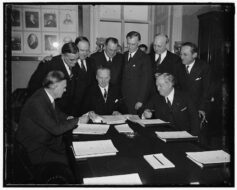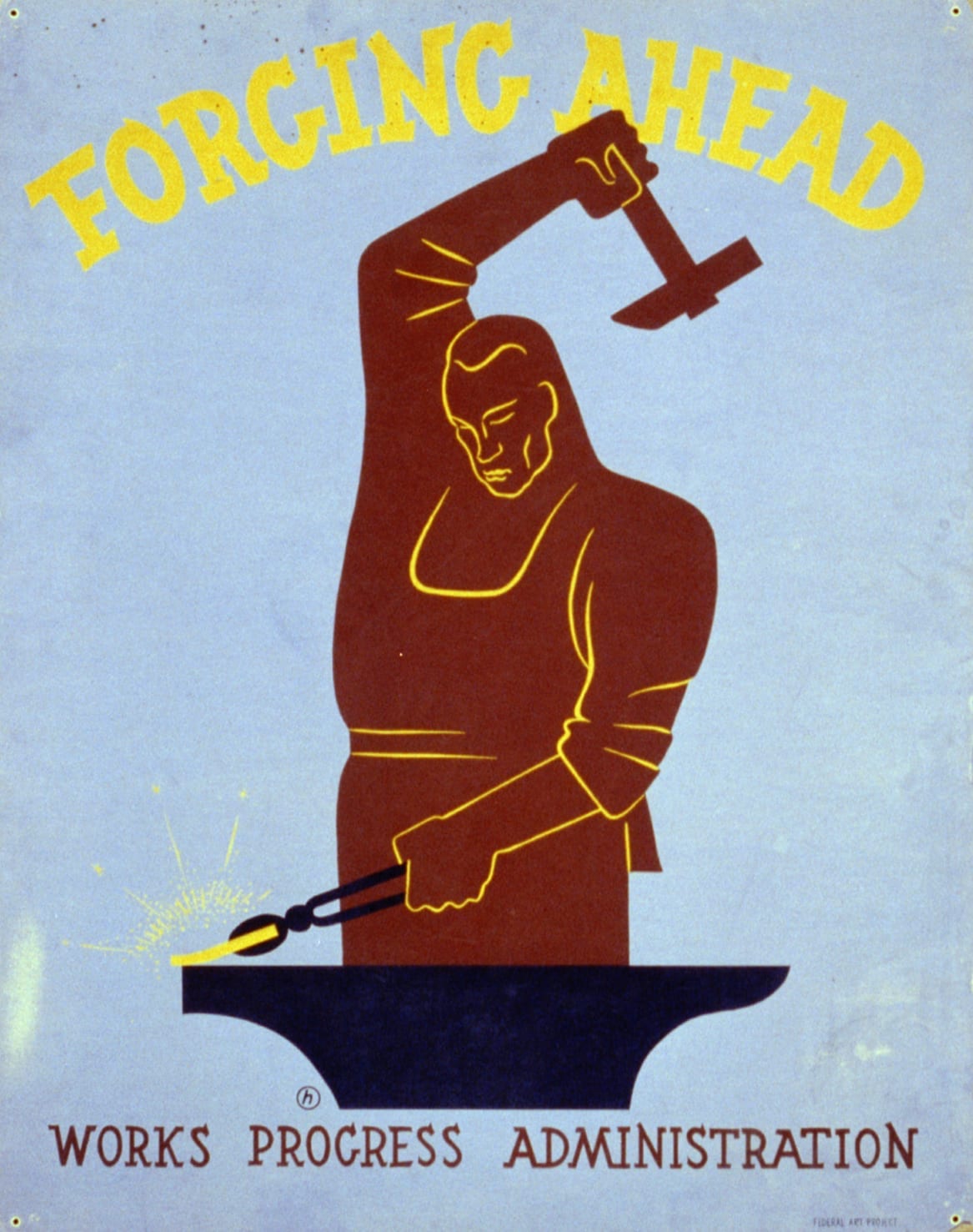


No related resources
Introduction
In Schechter v. United States, the Supreme Court invalidated the National Industrial Recovery Act (“Fireside Chat” On the Purposes and Foundations of the Recovery Program (1933); Schechter Poultry Corp. v. United States (1935)). Eight months later, in the Butler case, it did the same with the Agricultural Adjustment Act (AAA). Under this law, farmers could enter into voluntary contracts with the federal government in which they would receive subsidies in return for their agreement to grow less of certain agricultural products. The subsidies would be paid for from revenues generated by a special tax on processors such as cotton gin operators and mill owners. By mid-1935, thanks in part to the AAA, farm income had increased by about fifty percent since 1932. However, William Butler and others involved in the Hoosac Mills, which processed cotton, brought suit against the United States to challenge the constitutionality of the AAA, when they were taxed under its provisions.
The Schechter case had focused on the compulsory nature of the industrial codes, so the administration believed that, because the AAA was based on voluntary contracts, it would be more acceptable to the court. They were wrong. In a 6 – 3 decision written by Associate Justice Owen J. Roberts, the court took aim at the tax on processors. The Constitution, the justices pointed out, granted the power to tax for the purpose of the “general welfare,” not to bestow particular benefits on those who have agreed to adhere to special government regulations. The tax, therefore, was unconstitutional.
Because the Butler decision focused on the tax, and not on the principal of the subsidy, much of the AAA was salvageable. In February 1938, therefore, Congress approved – and the president quickly signed – a second Agricultural Adjustment Act that maintained the subsidies, while asserting that they would be funded from the general revenues of the federal government, and not from a special tax. Nevertheless, the Butler case represented a significant rebuke to the administration’s use of the taxing power to pursue its New Deal agenda.
http://newdeal.feri.org/court/297US1.htm
Source: Online from “FDR and the Supreme Court,” The New Deal Network (Columbia University: Institute for Learning Technologies),
There should be no misunderstanding as to the function of this court in such a case. It is sometimes said that the court assumes a power to overrule or control the action of the people’s representatives. This is a misconception. The Constitution is the supreme law of the land ordained and established by the people. All legislation must conform to the principles it lays down. When an act of Congress is appropriately challenged in the courts as not conforming to the constitutional mandate, the judicial branch of the government has only one duty; to lay the article of the Constitution which is invoked beside the statute which is challenged and to decide whether the latter squares with the former. All the court does, or can do, is to announce its considered judgment upon the question. The only power it has, if such it may be called, is the power of judgment. This court neither approves nor condemns any legislative policy. Its delicate and difficult office is to ascertain and declare whether the legislation is in accordance with, or in contravention of, the provisions of the Constitution; and, having done that, its duty ends.
The question is not what power the federal government ought to have, but what powers in fact have been given by the people. It hardly seems necessary to reiterate that ours is a dual form of government; that in every state there are two governments; the state and the United States. Each state has all governmental powers save such as the people, by their Constitution, have conferred upon the United States, denied to the states, or reserved to themselves. The federal union is a government of delegated powers. It has only such as are expressly conferred upon it and such as are reasonably to be implied from those granted. In this respect we differ radically from nations where all legislative power, without restriction or limitation, is vested in a parliament or other legislative body subject to no restrictions except the discretion of its members.
Article 1, § 8, of the Constitution, vests sundry powers in the Congress. But1 two of its clauses have any bearing upon the validity of the statute under review.
The third clause endows the Congress with power “to regulate Commerce . . . among the several States.” Despite a reference in its first section to a burden upon, and an obstruction of the normal currents of, commerce, the act under review does not purport to regulate transactions in interstate or foreign commerce. Its stated purpose is the control of agricultural production, a purely local activity, in an effort to raise the prices paid the farmer. Indeed, the government does not attempt to uphold the validity of the act on the basis of the commerce clause, which, for the purpose of the present case, may be put aside as irrelevant.
The clause thought to authorize the legislation, the first, confers upon the Congress power “to lay and collect Taxes, Duties, Imposts and Excises, to pay the Debts and provide for the common Defence and general Welfare of the United States. . . .” It is not contended that this provision grants power to regulate agricultural production upon the theory that such legislation would promote the general welfare. The government concedes that the phrase “to provide for the general welfare” qualifies the power “to lay and collect taxes.” The view that the clause grants power to provide for the general welfare, independently of the taxing power, has never been authoritatively accepted. Mr. Justice Story2 points out that, if it were adopted, “it is obvious that under color of the generality of the words, to ‘provide for the common defense and general welfare’, the government of the United States is, in reality, a government of general and unlimited powers, notwithstanding the subsequent enumeration of specific powers.” The true construction undoubtedly is that the only thing granted is the power to tax for the purpose of providing funds for payment of the nation’s debts and making provision for the general welfare.
Nevertheless, the government asserts that warrant is found in this clause for the adoption of the Agricultural Adjustment Act. The argument is that Congress may appropriate and authorize the spending of moneys for the “general welfare”; that the phrase should be liberally construed to cover anything conducive to national welfare; that decision as to what will promote such welfare rests with Congress alone, and the courts may not review its determination; and, finally, that the appropriation under attack was in fact for the general welfare of the United States.
The Congress is expressly empowered to lay taxes to provide for the general welfare. Funds in the Treasury as a result of taxation may be expended only through appropriation. They can never accomplish the objects for which they were collected, unless the power to appropriate is as broad as the power to tax. The necessary implication from the terms of the grant is that the public funds may be appropriated “to provide for the general welfare of the United States.” These words cannot be meaningless, else they would not have been used. The conclusion must be that they were intended to limit and define the granted power to raise and to expend money. How shall they be construed to effectuate the intent of the instrument?
Since the foundation of the nation, sharp differences of opinion have persisted as to the true interpretation of the phrase. Madison asserted it amounted to no more than a reference to the other powers enumerated in the subsequent clauses of the same section; that, as the United States is a government of limited and enumerated powers, the grant of power to tax and spend for the general national welfare must be confined to the enumerated legislative fields committed to the Congress. In this view the phrase is mere tautology, for taxation and appropriation are or may be necessary incidents of the exercise of any of the enumerated legislative powers. Hamilton, on the other hand, maintained the clause confers a power separate and distinct from those later enumerated, is not restricted in meaning by the grant of them, and Congress consequently has a substantive power to tax and to appropriate, limited only by the requirement that it shall be exercised to provide for the general welfare of the United States. Each contention has had the support of those whose views are entitled to weight. This court has noticed the question, but has never found it necessary to decide which is the true construction. Mr. Justice Story, in his Commentaries, espouses the Hamiltonian position. . . . While, therefore, the power to tax is not unlimited, its confines are set in the clause which confers it, and not in those of section 8 which bestow and define the legislative powers of the Congress. It results that the power of Congress to authorize expenditure of public moneys for public purposes is not limited by the direct grants of legislative power found in the Constitution.
But the adoption of the broader construction leaves the power to spend subject to limitations.
As Story says: “The Constitution was, from its very origin, contemplated to be the frame of a national government, of special and enumerated powers, and not of general and unlimited powers.”
Again he says: “A power to lay taxes for the common defense and general welfare of the United States is not in common sense a general power. It is limited to those objects. It cannot constitutionally transcend them.”
. . . We are not now required to ascertain the scope of the phrase “general welfare of the United States” or to determine whether an appropriation in aid of agriculture falls within it. Wholly apart from that question, another principle embedded in our Constitution prohibits the enforcement of the Agricultural Adjustment Act. The act invades the reserved rights of the states. It is a statutory plan to regulate and control agricultural production, a matter beyond the powers delegated to the federal government. The tax, the appropriation of the funds raised, and the direction for their disbursement, are but parts of the plan. They are but means to an unconstitutional end.
From the accepted doctrine that the United States is a government of delegated powers, it follows that those not expressly granted, or reasonably to be implied from such as are conferred, are reserved to the states or to the people. To forestall any suggestion to the contrary, the Tenth Amendment was adopted. The same proposition, otherwise stated, is that powers not granted are prohibited. None to regulate agricultural production is given, and therefore legislation by Congress for that purpose is forbidden.
It is an established principle that the attainment of a prohibited end may not be accomplished under the pretext of the exertion of powers which are granted. . . .
The power of taxation, which is expressly granted, may, of course, be adopted as a means to carry into operation another power also expressly granted. But resort to the taxing power to effectuate an end which is not legitimate, not within the scope of the Constitution, is obviously inadmissible.
. . .
. . . If the taxing power may not be used as the instrument to enforce a regulation of matters of state concern with respect to which the Congress has no authority to interfere, may it, as in the present case, be employed to raise the money necessary to purchase a compliance which the Congress is powerless to command? The government asserts that whatever might be said against the validity of the plan, if compulsory, it is constitutionally sound because the end is accomplished by voluntary co-operation. There are two sufficient answers to the contention. The regulation is not in fact voluntary. The farmer, of course, may refuse to comply, but the price of such refusal is the loss of benefits. The amount offered is intended to be sufficient to exert pressure on him to agree to the proposed regulation. The power to confer or withhold unlimited benefits is the power to coerce or destroy. If the cotton grower elects not to accept the benefits, he will receive less for his crops; those who receive payments will be able to undersell him. The result may well be financial ruin. The coercive purpose and intent of the statute is not obscured by the fact that it has not been perfectly successful. It is pointed out that, because there still remained a minority whom the rental and benefit payments were insufficient to induce to surrender their independence of action, the Congress has gone further, and, in the Bankhead Cotton Act,3 used the taxing power in a more directly minatory fashion to compel submission. This progression only serves more fully to expose the coercive purpose of the so-called tax imposed by the present act. It is clear that the Department of Agriculture has properly described the plan as one to keep a non-co-operating minority in line. This is coercion by economic pressure. The asserted power of choice is illusory. . . .
But if the plan were one for purely voluntary co-operation it would stand no better so far as federal power is concerned. At best, it is a scheme for purchasing with federal funds submission to federal regulation of a subject reserved to the states.
It is said that Congress has the undoubted right to appropriate money to executive officers for expenditure under contracts between the government and individuals; that much of the total expenditures is so made. But appropriations and expenditures under contracts for proper governmental purposes cannot justify contracts which are not within federal power. And contracts for the reduction of acreage and the control of production are outside the range of that power. An appropriation to be expended by the United States under contracts calling for violation of a state law clearly would offend the Constitution. Is a statute less objectionable which authorizes expenditure of federal moneys to induce action in a field in which the United States has no power to intermeddle? The Congress cannot invade state jurisdiction to compel individual action; no more can it purchase such action.
. . .
We are not here concerned with a conditional appropriation of money, nor with a provision that if certain conditions are not complied with the appropriation shall no longer be available. By the Agricultural Adjustment Act the amount of the tax is appropriated to be expended only in payment under contracts whereby the parties bind themselves to regulation by the federal government. There is an obvious difference between a statute stating the conditions upon which moneys shall be expended and one effective only upon assumption of a contractual obligation to submit to a regulation which otherwise could not be enforced. Many examples pointing the distinction might be cited. We are referred to appropriations in aid of education, and it is said that no one has doubted the power of Congress to stipulate the sort of education for which money shall be expended. But an appropriation to an educational institution which by its terms is to become available only if the beneficiary enters into a contract to teach doctrines subversive of the Constitution is clearly bad. An affirmance of the authority of Congress so to condition the expenditure of an appropriation would tend to nullify all constitutional limitations upon legislative power.
But it is said that there is a wide difference in another respect, between compulsory regulation of the local affairs of a state’s citizens and the mere making of a contract relating to their conduct; that, if any state objects, it may declare the contract void and thus prevent those under the state’s jurisdiction from complying with its terms. The argument is plainly fallacious. The United States can make the contract only if the federal power to tax and to appropriate reaches the subject-matter of the contract. If this does reach the subject-matter, its exertion cannot be displaced by state action. To say otherwise is to deny the supremacy of the laws of the United States; to make them subordinate to those of a state. This would reverse the cardinal principle embodied in the Constitution and substitute one which declares that Congress may only effectively legislate as to matters within federal competence when the states do not dissent.
Congress has no power to enforce its commands on the farmer to the ends sought by the Agricultural Adjustment Act. It must follow that it may not indirectly accomplish those ends by taxing and spending to purchase compliance. The Constitution and the entire plan of our government negative any such use of the power to tax and to spend as the act undertakes to authorize. It does not help to declare that local conditions throughout the nation have created a situation of national concern; for this is but to say that whenever there is a widespread similarity of local conditions, Congress may ignore constitutional limitations upon its own powers and usurp those reserved to the states. If, in lieu of compulsory regulation of subjects within the states’ reserved jurisdiction, which is prohibited, the Congress could invoke the taxing and spending power as a means to accomplish the same end, clause 1 of section 8 of article 14 would become the instrument for total subversion of the governmental powers reserved to the individual states.
If the act before us is a proper exercise of the federal taxing power, evidently the regulation of all industry throughout the United States may be accomplished by similar exercises of the same power. It would be possible to exact money from one branch of an industry and pay it to another branch in every field of activity which lies within the province of the states. The mere threat of such a procedure might well induce the surrender of rights and the compliance with federal regulation as the price of continuance in business. A few instances will illustrate the thought.
Let us suppose Congress should determine that the farmer, the miner, or some other producer of raw materials is receiving too much for his products, with consequent depression of the processing industry and idleness of its employees. Though, by confession, there is no power vested in Congress to compel by statute a lowering of the prices of the raw material, the same result might be accomplished, if the questioned act be valid, by taxing the producer upon his output and appropriating the proceeds to the processors, either with or without conditions imposed as the consideration for payment of the subsidy.
We have held in A. L. A. Schechter Poultry Corp. v. United States. . .that Congress has no power to regulate wages and hours of labor in a local business. If the petitioner is right, this very end may be accomplished by appropriating money to be paid to employers from the federal treasury under contracts whereby they agree to comply with certain standards fixed by federal law or by contract.
Should Congress ascertain that sugar refiners are not receiving a fair profit, and that this is detrimental to the entire industry, and in turn has its repercussions in trade and commerce generally, it might, in analogy to the present law, impose an excise of 2 cents a pound on every sale of the commodity and pass the funds collected to such refiners, and such only, as will agree to maintain a certain price.
Assume that too many shoes are being manufactured throughout the nation; that the market is saturated, the price depressed, the factories running half time, the employees suffering. Upon the principle of the statute in question, Congress might authorize the Secretary of Commerce to enter into contracts with shoe manufacturers providing that each shall reduce his output, and that the United States will pay him a fixed sum proportioned to such reduction, the money to make the payments to be raised by a tax on all retail shoe dealers on their customers.
Suppose that there are too many garment workers in the large cities; that this results in dislocation of the economic balance. Upon the principle contended for, an excise might be laid on the manufacture of all garments manufactured and the proceeds paid to those manufacturers who agree to remove their plants to cities having not more than a hundred thousand population. Thus, through the asserted power of taxation, the federal government, against the will of individual states, might completely redistribute the industrial population.
A possible result of sustaining the claimed federal power would be that every business group which thought itself underprivileged might demand that a tax be laid on its vendors or vendees, the proceeds to be appropriated to the redress of its deficiency of income.
These illustrations are given, not to suggest that any of the purposes mentioned are unworthy, but to demonstrate the scope of the principle for which the government contends; to test the principle by its applications; to point out that, by the exercise of the asserted power, Congress would, in effect, under the pretext of exercising the taxing power, in reality accomplish prohibited ends. It cannot be said that they envisage improbable legislation. The supposed cases are no more improbable than would the present act have been deemed a few years ago.
Until recently no suggestion of the existence of any such power in the federal government has been advanced. The expressions of the framers of the Constitution, the decisions of this court interpreting that instrument and the writings of great commentators will be searched in vain for any suggestion that there exists in the clause under discussion or elsewhere in the Constitution, the authority whereby every provision and every fair implication from that instrument may be subverted, the independence of the individual states obliterated, and the United States converted into a central government exercising uncontrolled police power in every state of the Union, superseding all local control or regulation of the affairs or concerns of the states.
Hamilton himself, the leading advocate of broad interpretation of the power to tax and to appropriate for the general welfare, never suggested that any power granted by the Constitution could be used for the destruction of local self-government in the states. Story countenances no such doctrine. It seems never to have occurred to them, or to those who have agreed with them, that the general welfare of the United States (which has aptly been termed “an indestructible Union, composed of indestructible States,”) might be served by obliterating the constituent members of the Union. But to this fatal conclusion the doctrine contended for would inevitably lead. And its sole premise is that, though the makers of the Constitution, in erecting the federal government, intended sedulously to limit and define its powers, so as to reserve to the states and the people sovereign power, to be wielded by the states and their citizens and not to be invaded by the United States, they nevertheless by a single clause gave power to the Congress to tear down the barriers, to invade the states’ jurisdiction, and to become a parliament of the whole people, subject to no restrictions save such as are self-imposed. The argument, when seen in its true character and in the light of its inevitable results, must be rejected. . . .
- 1. “But” is used here in its meaning of “only.”
- 2. Joseph Story served on the Supreme Court from 1812 to 1845. His Commentaries on the Constitution of the United States appeared 1833.
- 3. The Bankhead Cotton Act of 1934 was intended to clarify the cotton production provision of the Agricultural Adjustment Act of 1933.
- 4. “The Congress shall have power to lay and collect taxes, duties, imposts, and excises, to pay the debts and provide for the common defence and general welfare of the United States.”
Betrayal of the Democratic Party
January 25, 1936
Conversation-based seminars for collegial PD, one-day and multi-day seminars, graduate credit seminars (MA degree), online and in-person.




